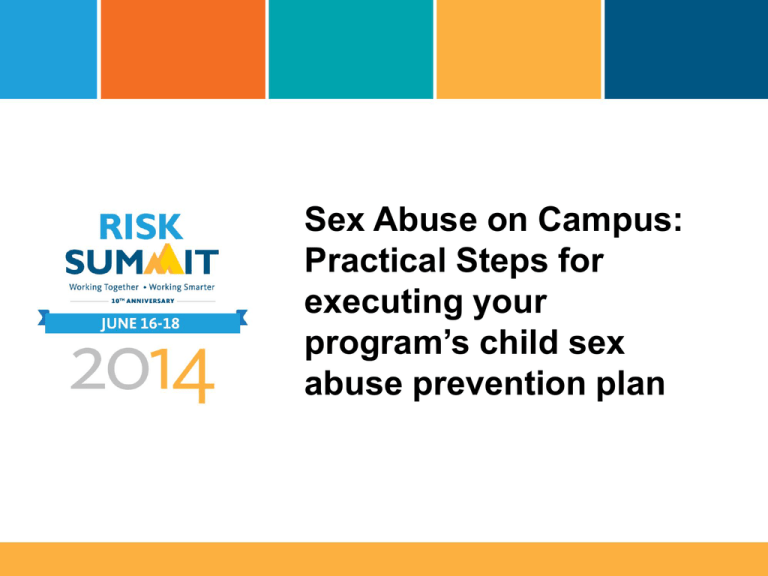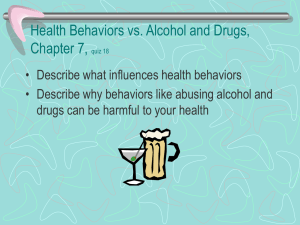
Sex Abuse on Campus:
Practical Steps for
executing your
program’s child sex
abuse prevention plan
About Praesidium
“To help you protect those in your care from abuse and to help
preserve trust in your organization.”
• Two decades of experience
• More than 4,000 clients
• Completed thousands of root cause analyses
• Developed comprehensive abuse risk management model
• Full range of risk management solutions
• National safety partner with:
• YMCA of the USA, BGCA of America, USA Swimming
(Olympics NGB), Church Pension Group (covering the
Episcopal community), CWLA, and CMSM (Conference of
Major Superiors of Men)
What We Believe
• Abuse can be prevented
• Everyone is responsible for preventing
abuse
• Abuse prevention requires a commitment
to quality
• Commitment starts at the top
The Praesidium Safety Equation™
Scope of the Problem
•
•
•
•
•
•
1 in 4 girls / 1 in 6 boys
10% of school children
300% increase in child-to-child abuse
80% of abuse does not get reported
Frequency in higher education unknown
Legislature changes facilitate litigation
Effects of Abuse on Victims
•
•
•
•
•
Psychological
Educational
Behavioral
Interpersonal
Sexual
Effects of Abuse on Organizations
•
•
•
•
•
Threat to the Mission
Awards from $3,000 to Multi-Millions
Plaintiffs Prevail in Two-Thirds of Cases
Jeopardizes Insurability
Reputational Damage
Common Claims in Litigation
•
•
•
•
Negligent Screening
Negligent Training
Negligent Supervision
Negligent Retention
How Offenders Operate on Campus
Types of offenders
• Preferential
• Situational
• Indiscriminate
Conditions necessary to offend
• Access
• Privacy
• Control
Praesidium’s Six Step Approach
• Step 1. Establish policies for programs
involving minors.
• Step 2. Develop a screening process
designed to screen out offenders.
• Step 3. Provide training with compliance
tracking.
• Step 4. Supervise for Safety.
• Step 5. Implement system for reporting
and responding.
Step 1. Establish policies for
programs involving minors.
• Define boundaries
• Create institutional memory
• Communicate effectively
Step 2: Develop a screening process
designed to screen out offenders.
• Screen based on position access
• Encourage applicants to self select out
• Assess for abuse risk
Step 3. Provide training with
compliance tracking.
• The right content
– Preventative vs. reactive
– Actionable
– Program specific
• Easy to access and use
• Targets the right people the right way (blended
learning)
– In-person for leadership
– In-person and online training for program directors
and targeted programs/groups
– Online training for staff, students and volunteers
• Easy to verify compliance
Step 4. Supervise for Safety.
• Monitoring minors
• Supervising staff
• Managing high-risk situations
Step 5. Implement system for
reporting and responding.
• Develop written response procedures
• Activate response procedures and initiate
response communications
• Remove barriers to reporting
Questions You Should be Asking
• Do you have written polices that clearly define
boundaries?
• Does your screening process assess for abuse
risk?
• Do you require all staff to complete training that
is preventative not just reactive?
• Do you have specific procedures for managing
high-risk activities related to abuse?
• Do you have a written procedure for responding
to suspicious behaviors that do not raise to the
level of abuse?
Praesidium Resources
•
•
•
•
•
•
•
•
Online Program Self Assessment
Onsite Risk Assessment
Minors on Campus Survey
Model Youth Protection Policies
Armatus® Online Training
On-site Training
Confidential Reporting Helpline
Consultation Services and Crisis
Management
Contact Us
Aaron Lundberg, LMSW
VP of Account Services/COO
ALundberg@PraesidiumInc.com
Candace Collins, JD
Safety Analyst
CCollins@PraesidiumInc.com
www.PraesidiumInc.com
(817) 801-7773








